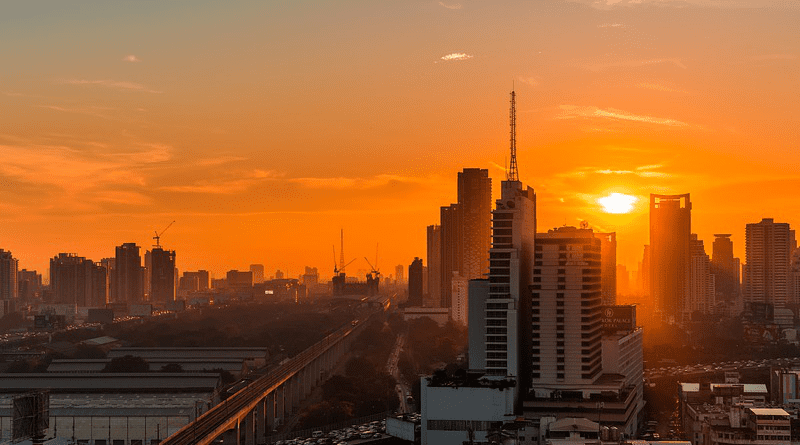Thailand: Opposition parties Score Big Win In Election, Unofficial Results Show
By BenarNews
By Nontarat Phaicharoen and Wilawan Watcharasakwe
Thailand’s pro-democracy political opposition pulled off a big electoral win Sunday as its main parties clinched hundreds of parliamentary seats in their bid to oust an entrenched military-backed government, according to uncertified results.
The Move Forward and Pheu Thai parties came out on top virtually neck-and-neck as they won a combined 225 directly elected seats, based on 99% of votes counted by the Election Commission.
The two military-aligned parties from the ruling bloc were obliterated in Sunday’s national polls, winning a combined 62 directly elected seats.
The United Thai Nation Party, headed by former junta chief and Prime Minister Prayuth Chan-o-cha, won only 23 seats. The opposition also swept all 33 seats representing constituencies in Bangkok.
The leader of Move Forward, which held a slight edge over Pheu Thai at press time, told a news conference late Sunday night that his party planned to join forces with Pheu Thai in an effort to form a new ruling coalition.
“We are taking the stand that in forming the government, there will be no military parties in disguise,” Pita Limjaroenrat, Move Forward’s Harvard-educated leader and prime ministerial hopeful, told reporters in Thai at his party’s headquarters. “We will exclude the Palang Pracharath Party and the United Thai Nation Party from the coalition.”
Pheu Thai is the main opposition party associated with former Prime Minister Thaksin Shinawatra, who was deposed in a military coup in 2006. Thaksin’s daughter, Paetongtarn Shinawatra, is one of Pheu Thai’s candidates for PM.
“I’m 100% confident today is going to be a good day,” Paetongtarn said after casting her vote earlier in the day.
However, even though the two opposition parties may form a post-polls alliance, that prospect is far from certain because voting rules enshrined in a constitution drafted by the military in 2017 could see a junta-appointed Senate block their path to power.
“The will of the people is likely to be thwarted again. I just don’t see the Senate respecting popular will; they were created and appointed to do one thing, maintain the conservative-royalist hold on politics,” Zachary Abuza, a Washington-based expert on Southeast Asia, told Reuters, referring to how those electoral rules were used to block another win by the opposition at the polls in 2019.
“I see no path forward for a 376 seat pro-democracy coalition that is needed to overcome the Senate’s vote for the prime minister,” said Abuza, a columnist and regular contributor to BenarNews.
The ballot counting began when polls closed at 5 p.m., after millions of Thais turned out at voting sites across the country to elect members of the 500-seat House of Representatives for the next four years.
Roughly 52 million of Thailand’s 65 million population – including some 3.3 million first-time voters – were eligible to cast votes, with the Election Commission projecting a turnout of more than 80%.
Ekkapong Wataaprom, a 38-year-old graphic designer, said she wanted to see change after nearly a decade of military-backed rule.
“I hope the new government honors its campaign promises, because past governments haven’t kept their word,” she said after voting in Bangkok. “I’m worried about fairness. I hope there are no irregularities.”
Another voter, Charoen Khunpenthip, 59, said after nine years of “hardship” he wanted a visionary government that treated people nicely.
Prayuth, the former army chief and a staunch royalist, has held power since he spearheaded a coup that toppled the government of Thaksin’s sister, Yingluck Shinawatra, in May 2014. His time in power has been tumultuous in the past few years, marked by crackdowns and youth-led protests demanding more democratic freedoms.
Prayuth, 69, was running as a candidate for the United Thai Nation Party, after quitting the ruling Palang Pracharath Party in December.
His deputy prime minister and fellow retired army general, Prawit Wongsuwan, was vying against him as a nominee for the PPP.
Prayuth was relatively tight-lipped after voting in Bangkok, but said he wanted to see the “biggest turnout possible according to the democratic way.”
Move Forward and regional heavyweight the Bhumjaithai Party, a member of the current ruling bloc, are likely to play prominent roles in post-election talks. Bhumjaithai won 68 directly elected seats in Sunday’s polls.
According to the 2017 electoral rules, Thai voters directly elected 400 members in the 500-seat parliament. The remaining 100 seats – so-called partly-list seats – will be allocated to different parties according to their share of the nationwide vote. Both houses of Parliament, including 250 senators appointed by the junta, will later elect the prime minister.
The identity of the next prime minister might not be known until weeks or months after the vote, as Thailand’s electoral system allows up to 60 days for the release of official results, and parliament convenes two weeks later to vote for the nation’s leader.
In the meantime, fears have been raised about a return to street demonstrations if a party wins big but is unable to take power.
When asked Thursday about whether that could prompt another military intervention, Army Gen. Narongpan Jittkaewtae said he was not concerned and there was “zero chance” of a coup, the Bangkok Post reported.

